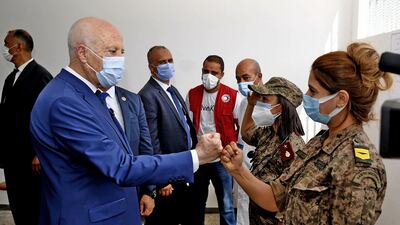Tunisia is often cited as the one success of the 2011 Arab uprisings that toppled several regimes in the region. But neither economic prosperity nor political stability emerged from the Tunisian revolution. The situation came to a boil last month when people took to the streets in protest – against the state of the economy, corruption and the official handling of the coronavirus pandemic in their country.
The protests prompted President Kais Saied to take over. A law professor without a political party who rose to power in 2019, Mr Saied dismissed prime minister Hichem Mechichi, who had been in office for less than a year, and suspended parliament for a month. The health minister, too, was dismissed in light of the worsening Covid-19 situation in the North African country.
In the past 10 years, Tunisia has had nine governments. Add to that, the country has been under a state of emergency since two terror attacks in 2015. Unemployment that was at 14.9 per cent before the pandemic was at 17.4 per cent at the end of last year.
So even as Tunisia's Islamist party, Ennahda, criticised Mr Saied's shake-up, many Tunisians lauded Mr Saied and saw it as necessary in a country that is all too familiar with struggles. A local poll last week showed that 87 per cent of Tunisians supported the move.
Tunisia needs all the help it can get. With debt repayment issues and budget deficits, the country is seeking as much as $4 billion from the International Monetary Fund. Since freezing parliament, Mr Saied has pledged to address the country's deep economic morass, including what he said was the plundering of $4.8bn of public money by officials.
Countries from around the Arab world understand the need for stability and prosperity in Tunisia. Morocco, Egypt, Algeria are among countries that sent envoys to express their support for Mr Saeid and Tunisia. Yesterday, UAE Presidential Adviser Dr Anwar Gargash delivered a letter from President Sheikh Khalifa to Mr Saied stating the UAE's solidarity with the people. The UAE's support has been illustrated in the past fortnight as the country sent 47 tonnes of crucial medical supplies – after an earlier dispatch of 500,000 doses of Covid-19 vaccines to the country.
Vaccination drives in Tunisia, a country of close to 12 million people, began in March. But until recently, progress had been slow; only 8 per cent of the population had received their shots until last week. Corresponding with the rising number of cases, frustration has been growing among many Tunisians at the government's handling of the pandemic. The country has seen more than 600,000 infections and more than 20,000 people have died from the virus.
However, there is reason for cautious optimism.
On Sunday, a remarkable 5 per cent of the country got their jabs – that is, more than half a million people. Compared to the sluggish pace in the preceding months, this could be a turning point. It takes a huge effort to inoculate so many people in one day and Tunisia showed what it could be capable of, despite the undeniable challenges. At centres across the country, medical staff and volunteers representing youth groups, the Tunisian Scouts, the Red Crescent and others rallied together to give the vaccination drive a much-needed boost. Indeed, if this level of effort can be sustained in other areas of administration, the country's future can yet hold promise.


